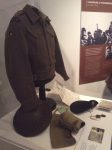One of the displays in the exhibit Canada Responds to the Holocaust, 1944-1945, which was at the Vancouver Holocaust Education Centre in 2016. (photo by Cynthia Ramsay)
Nearly half of Canadians are not able to name a single Holocaust concentration camp. A large number of Canadians do not know that six million Jews died in the Shoah, offering up numbers like two million, with nearly one in four admitting outright that they just don’t know. Among millennials, those aged 18 to 34, the numbers are particularly disturbing: 22% have not heard of the Holocaust or are not sure whether they have (which seems like much the same thing). One in three Canadians thinks that this country had an open immigration policy for Jewish refugees in the 1930s, unaware that very few Jews were permitted into Canada in the lead up to genocide.
These are some of the details found in a survey conducted on behalf of the Azrieli Foundation and the Claims Conference. The study was based on 1,100 interviews of Canadians to coincide with International Holocaust Remembrance Day Sunday. (See story, “Emerging from terrible abyss. ”)
On the positive side, 85% of respondents said it’s important to keep teaching about the Holocaust in order to prevent such a thing from happening again, while 82% said that all students should learn about this part of history.
In reality, it is unlikely that all Canadian students will learn about the Holocaust. In British Columbia, for example, the Holocaust only became part of the core curriculum with the overhaul of the entire provincial curriculum three years ago – and only if the teacher chooses to include it. The history of genocide is one module that teachers are able to select from a range of subject components at particular grade levels. Therefore, it is still a crapshoot whether a student graduating from the British Columbia education system will have much or any knowledge on the subject.
It is extraordinarily unlikely that the curriculum will be revised again any time soon to make Holocaust education mandatory across the system. Educators complain, with good reason, that they are expected to teach more content than there are hours in a day. Competing needs, including career preparation and life skills, contend with subjects like history for class time.
In Canada, where the educational curriculum is determined by every province, similar discussions take place across the country and a patchwork of curricula exist.
At the same time, a massive shift in the larger culture has taken place, eliminating what had been, until the last few decades, a largely shared body of knowledge. In the days when there were only a couple of television networks, and hard copy newspapers were most people’s sources of information, everyone would generally be aware of similar issues and events. Half of all televisions in the United States in 1978, for example, were tuned in to the nine-and-a-half-hour miniseries Holocaust (a program that was admittedly not without its critics among Jews, historians and others).
The internet and the proliferation of cable TV channels has refracted our attention in unlimited directions. People now largely self-select the information they receive and that can blind us to matters outside of our spheres.
In a better world, knowledge of the Holocaust would be universal. In the world we live in, it remains vital to continue to focus attention on the subject whenever possible – and to use this history to educate about other genocides and violations of humanity while not diminishing the uniqueness of the Shoah itself.
Organizations devoted to the critical work of Holocaust education, including the Vancouver Holocaust Education Centre, are carrying a heavy burden for the larger society and depend on public support to meet their mandate. The Azrieli Foundation, which undertook this study, publishes survivor memoirs and funds a variety of Holocaust-related projects across Canada. Other groups, to varying degrees, share the burden of teaching this history, including universities, synagogues, Hillels, book publishers and authors, and so forth.
Unquestionably, the most powerful form of Holocaust education is firsthand testimony from survivors and witnesses. British Columbians who are survivors of the Holocaust have spoken to tens of thousands of students but, in a handful of years, this method of transmitting history will no longer be possible. Innovative strategies are being developed, such as the New Dimensions in Testimony oral history project, a collaboration involving Steven Spielberg’s USC Shoah Foundation, which includes holographic representations of survivors with whom students and others can interact virtually. This project recognizes that the issue is not only to continue educating, but to find ever-advancing means of doing so effectively.
The breadth of the challenge was underscored by Prof. Jan Grabowski, who delivered the Rudolf Vrba Memorial Lecture at the University of British Columbia last November. He and a team of scholars and researchers are visiting town and city archives across Poland, doing primary research on the events that led to the murder of three million Jews in that country. In other words, we’re still compiling the most basic facts of that history and, it may be safe to say, we are just as far away as ever as to understanding the larger moral questions – How? Why? – the Holocaust raises. Much work remains to be done.

